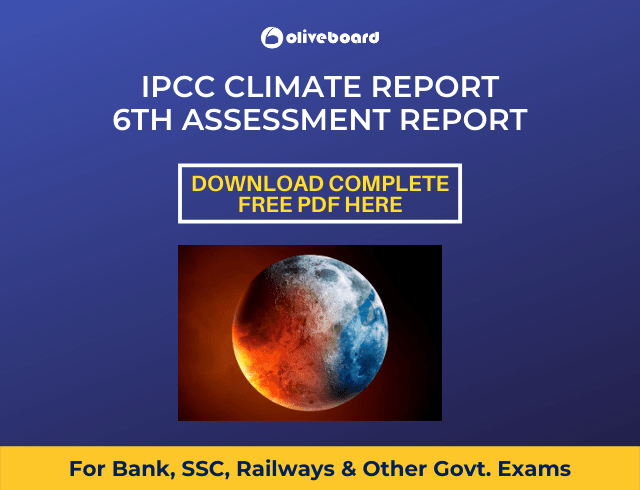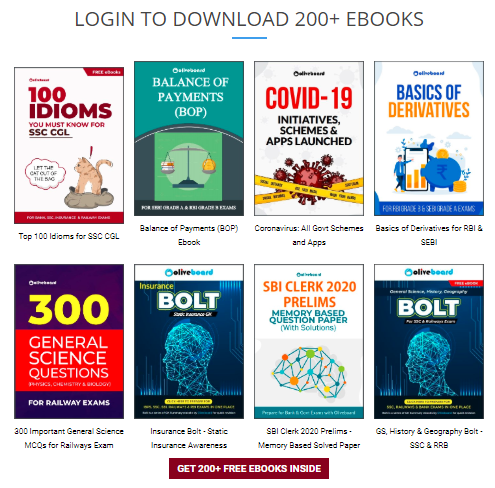Current Affairs is an integral part of the general awareness section. Questions related to climate change are common in the general awareness section of Government exams like SSC CGL, SSC CPO, RRB ALP, RRB Group D, UPSC, and more. Get complete study notes on IPCC Climate Report [6th Assessment Report] in this blog.
IPCC Climate Report
Current affairs is an integral part of the general awareness section. Questions related to Environment and Ecology are common in the general awareness section of Government exams like SSC CGL, SSC CPO, RRB ALP, RRB Group D, UPSC and more.
In competitive exams, as little as 1 mark can make a lot of difference. For your assistance, we bring to you a Free e-book on IPCC Climate report 2021. The following pages of the eBook list down all you need to know about the IPCC Climate report 2021.
The Working Group 1 contribution to the Sixth Assessment Report “Climate Change 2021 : The Physical Science” was released on 9th August 2021 by the IPCC.
The report, prepared by 234 scientists from 66 countries, highlights that human actions have contributed majorly to warming the climate at an unprecedented rate.
The report was well received by the UN and India. The report highlights the immediate need of action by the developed and developing countries to reduce global warming.
Some key takeaways from the report are as follows :
The world will probably reach or exceed 1.5oC (2.7oF) of warming by 2040
- The report mentions that there is a 50% chance that the 1.5oC threshold is reached or crossed between by 2040
- In 2019, concentrations of CO2 in the atmosphere were higher than at any time in at least 2 million years and concentrations of methane and nitrous oxide were higher than at any time in at least 800,000 years
- Global temperatures have increased at higher levels since 1970 than previously ever recorded.
- Under a high-emissions scenario, the world would reach the 1.5oC threshold even more quickly by 2037 and exceed upto 4oC by the end of the century
Limiting global warming to 1.5oC by the end of the century requires transformational change
- The report suggests that without rapid reductions in CO2 emissions, achieving the goals of the 2015 Paris Agreement will be beyond reach.
- The world’s remaining carbon budget is only 400 gigatonnes of carbon dioxide (GtCO2) as of the beginning of 2020. At the current levels of 36.4 GtCO2 per year, this amounts to about 10 years before we exhaust the carbon budget.
- If the world takes very ambitious action to curb emissions in the 2020s, we can still limit global warming to 1.5oC by the end of the century. Small scale reductions would not be sufficient.
- The world needs to reach net-zero CO2 emissions and make major reduction in other greenhouse gases like methane. Carbon removal through natural approaches like planting trees or technological approaches like direct air capture and storage can help in reducing emissions.
Evidences of link between global warming and extreme weather are now stronger than ever
- Greater observational data, paleoclimate reconstructions, higher-resolution models, enhanced stimulation ability has now proved that human-made emissions, from burning fossil fuels and cutting down trees, are responsible for recent warming.
- Of the 1.1oC warming observed since the pre-industrial era, the IPCC finds that less than 0.1oC is due to natural causes, such as volcanoes or variations in the sun.
- Human-induced warming has likely been the main reason for glacial retreat since the 1990s, the reduction of Arctic sea ice and global sea level rise since at least 1970.
- Heavy rain events which were recorded once a decade, before human actions drove global warming, are now 1.3 times more likely and 6.7% wetter
- Severe droughts which were previously seen once a decade could happen every five or six years
- Heat waves previously seen twice a century are now stronger and could happen roughly every six years with 1.5oC of warming. Heat waves show the strongest increases in frequency with warming compared to all other extreme events.
- Global mean sea level has risen faster since 1900, than over any preceding century. Extreme sea level events that previously occurred once in 100 years could happen every year by the end of this century.
- Sea level may rise by 0.11m by 2030. By 2100, it will have risen by 0.71m and by 2150, it would be up by 1.24m.
- The IPCC report revealed that the Indian Ocean is warming at a higher rate than other oceans.
- Ocean acidification is at the highest level since 26000 years
- Summer Arctic ice coverage smaller than anytime in last 1000 years
Every degree of warming leads to more dangerous and costly impacts.
- With every fraction of increase in warming, many effects of climate change – melting ice sheets, rising seas, species loss and highly acidic oceans – will become irreversible over time.
- Danger of runaway warming is persistent. Here land, which is a carbon sink turns into a carbon emitter and starts releasing carbon instead of absorbing it. It is already being seen in the Amazon rainforest. Amazon rainforest is now emitting more CO2 than it absorbs due to deforestation, fires and droughts.
- This not only affects the world’s climatic conditions, but creates food and water security risks to countries and may lead to irreversible biodiversity loss.
Warnings from IPCC
The IPCC warns that it is now time for governments, businesses and investors to take actionable steps to face the crisis ahead. With COP26 climate negotiations in November in Glasgow, it is crucial for countries to set 2030 emissions-reduction targets and commit to reaching net-zero emissions to avoid climate tipping point.
Countries must keep the IPCC report’s findings in mind while making commitments so that we give ourselves a fighting chance for a safer future.
About IPCC
- The Intergovernmental Panel on Climate Change (IPCC) is the international body for assessing the science related to climate change.
- The IPCC was created in 1988 by the World Meteorological Organization (WMO) and United Nations Environment Programme (UNEP) to provide policymakers with regular scientific assessments on climate change, its implications and potential future risks, as well as to put forward adaptation and mitigation options
Here’s a Sample Question:
Ques 1: COP26 is to be held in which city?
- Paris
- Glasgow
- Rome
- Munich
Answer: The correct answer is B. Glasgow
How To Download The Free e-book?
Step 1: Click on the above-given download link. You will be taken to Oliveboard’s FREE E-Books Page.

Step 2: Register/Login on to the Free E-Books Page of Oliveboard (It is 100% free, You just enter your valid email ID and a password to be able to download the IPCC Climate Report).
Step 3: After Logging in, you will be able to download the free e-book.
Ebooks
You can download 200+ ebooks important for SSC, Banking, Railway, Insurance, and other government exams here.
Oliveboard Bolt series E-books:

